Dealing with emotions and having the right mindset whilst trading can be one of the hardest parts of becoming a successful trader. Humans simply aren’t completely rational beings, especially not when hard-earned money is at risk. That’s why the main differentiator between winning and losing traders is not their strategies. It is their mindset!
To acquire the mindset of a winning trader, you can read books to learn from the industry’s best. This article will cover the best trading psychology books that I have personally read and enjoyed. Some of the books have been written by well-known and highly respected psychologists such as the Nobel Prize winner Daniel Kahneman. Some of the other books that I will present give you direct insights into how some of the most successful traders deal with their psychology.
The amount of knowledge and value you get for the price of one book is incomparable with any trading course, seminar or conference that you will ever participate in.
(Note that the Amazon links in this article are affiliate links which means I receive a small compensation for sales made through these links. There are no added costs for you and this does not influence the objectivity of my review.)
1. Trading In The Zone by Mark Douglas
‘Trading In The Zone’ is a book written by Mark Douglas who is also the author of the ‘The Disciplined Trader’ – another book on trading psychology. It is the first and best trading psychology books that I have read so far. The 216-page long book has 11 chapters covering various trading psychology topics.
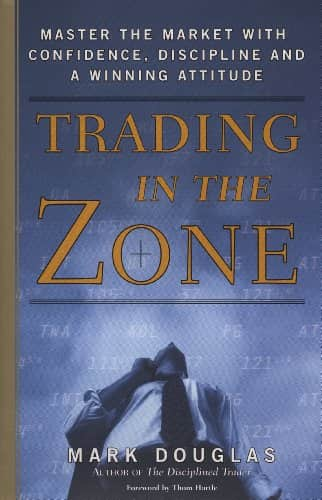
In ‘Trading In The Zone‘, Mark Douglas states that he thinks the main factor separating winning from losing traders is their mindset. Therefore, his goal with this book is to help you acquire the mindset of a winning trader. The book teaches you to think in probabilities and focus on the big picture instead of focussing on the results of single trades. Furthermore, Mark Douglas provides you with a concrete list of rules to follow to make sure you are making good trades. Ever since I read this book, I have printed out a copy of this list and some additional notes from the book and taped it next to my trading screen.
One major part of ‘Trading In The Zone’ is Mark Douglas’ so-called ‘Five Fundamental Truths’:
- Anything can happen.
- You don’t need to know what is going to happen next in order to make money.
- There is a random distribution between wins and losses for any given set of variables that define an edge.
- An edge is nothing more than an indication of a higher probability of one thing happening over another.
- Every moment in the market is unique.
Without reading the book, some of these truths might seem obscure. However, after reading the book, you should understand why each of these truths is indeed the truth. Understanding these truths allows you to trade like a casino without getting emotional because of a losing trade.
If you are struggling with emotions while trading or have problems handling losing trades, this trading psychology book will definitely help you deal with this.
2. The Daily Trading Coach – 101 Lessons For Becoming Your Own Trading Psychologist by Brett N. Steenbarger
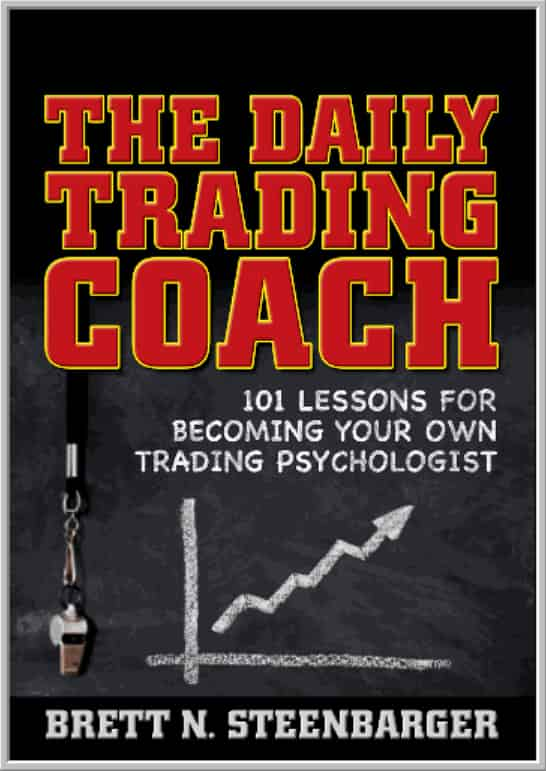
‘The Daily Trading Coach’ was written by Brett N. Steenbarger, PhD – a clinical associate professor of psychiatry and behavioral sciences at State University of New York Upstate, trader and author of multiple trading psychology books.
Professional traders that work in trading firms often have access to psychologist trading coaches such as Brett N. Steenbarger. These trading coaches help the traders solve various of their trading problems so that they can become better and more profitable traders. Retail traders such as you and me, however, usually don’t have access to this kind of service.
To solve this problem, Brett N. Steenbarger wrote ‘The Daily Trading Coach’. The goal of the book is to help you become your own daily trading coach. The 349-page long book has 11 chapters that cover 101 different trading lessons.
‘The Daily Trading Coach’ is not written in the same way as most other books. It isn’t designed to be read once from the start to the end. Instead, it is divided into chapters that each cover a different psychological trading problem. These chapters are then further divided into different trading lessons with coaching cues (clear exercises to help you deal with certain problems), resources and much more.
This means you can always go to any section of the book to clearly find out how to deal with a specific psychological trading problem. There you will find concrete coaching cues that you can add to your trading process to help you improve that aspect of your trading. While reading this book, I recommend focusing on a few aspects of your trading at once. I don’t recommend trying to improve all the mentioned aspects of your trading by doing all the exercises at once. This would be way too overwhelming and likely lead to no or very small improvements only.
If you want to learn how to become your own trading coach with concrete trading exercises from a clinical psychologist that often helps professional traders with their trading problems, I highly recommend checking out ‘The Daily Trading Coach’ by Brett N. Steenbarger.
3. Thinking, Fast and Slow by Daniel Kahneman
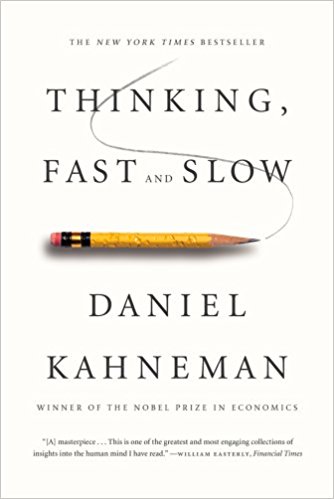
The International bestseller ‘Thinking, Fast and Slow’ was written by the psychologist Daniel Kahneman who was awarded the Nobel Prize in Economics in 2002.
Even though the book covers trading concepts such as decision making under uncertainty, risk and more, it is not written specifically for traders. Instead, it tries to explain how humans think. It presents different kinds of thinking systems (a fast and a slower one) and the issues with each.
The 499-page long book is divided into 5 parts (Two Systems, Heuristics
One of the things presented in the book is ‘Prospect Theory‘ that tries to explain how people make decisions under uncertainty and risk. One very interesting finding of Kahneman is the effect of wins and losses of the same size on humans. He found that a loss will negatively affect someone significantly more than a same-sized profit will impact the same person positively.
The following graph illustrates the asymmetry of the emotional impact of a same-sized profit or loss on most people. All the intricacies of this model are thoroughly presented in the book.
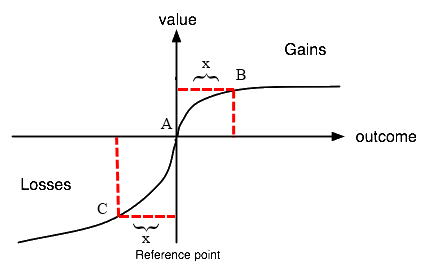
In my opinion, this trading psychology book is written very well. Daniel Kahneman presents the different biases, heuristics, and theories with a lot of examples and very small exercises so that you can see if you too make irrational decisions. This book might very well severely impact the way you think, not only while trading. Therefore, I definitely recommend reading Thinking, Fast and Slow.
4. Reminiscences of a Stock Operator by Edwin Lefèvre
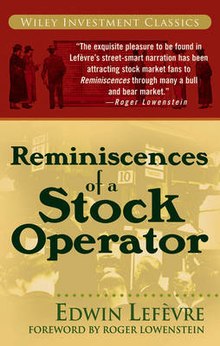
‘Reminiscences of a Stock Operator’ by Edwin Lefèvre is a classic trading book that belongs into every trader’s bookshelf. Even though this book was originally published almost a century ago (1923), it still covers some very relevant and important topics.
The book is about the life and trading of one of the best traders of all time, Jesse Lauriston Livermore (July 26, 1877 – November 28, 1940). During the 1929 crash before the Great Depression, Livermore made about 100 million US Dollars in total. Note that this was in ‘1929 USD’, which would be multiple billion USD in ‘today’s Dollars’.
During his career as a trader, Livermore made and lost fortunes multiple times. He ended his life in 1940 after losing everything yet another time. So it is safe to say that Livermore had A LOT of trading experience and important lessons to share.
‘Reminiscences of a Stock Operator’ was ranked 15th on ‘Fortune’s 75: The Smartest Books We Know’ and labeled a classic by The Wall Street Journal. The book has 24 chapters and a length of about 247 pages.
This book is not a trading psychology specific book. Nevertheless, it covers some important psychological and other trading lessons that Livermore has learned during his career. It is not often that you get the opportunity to learn from one of the best traders in history. So like I said before, this is a book that every trader should read.
5. Market Wizards Series by Jack D. Schwager
Jack D. Schwager is a trader and the author of an entire series of trading books: The ‘Market Wizards’. Up to this point, I have read two out of the ‘Market Wizards’ books and I already own the third book out of the series.
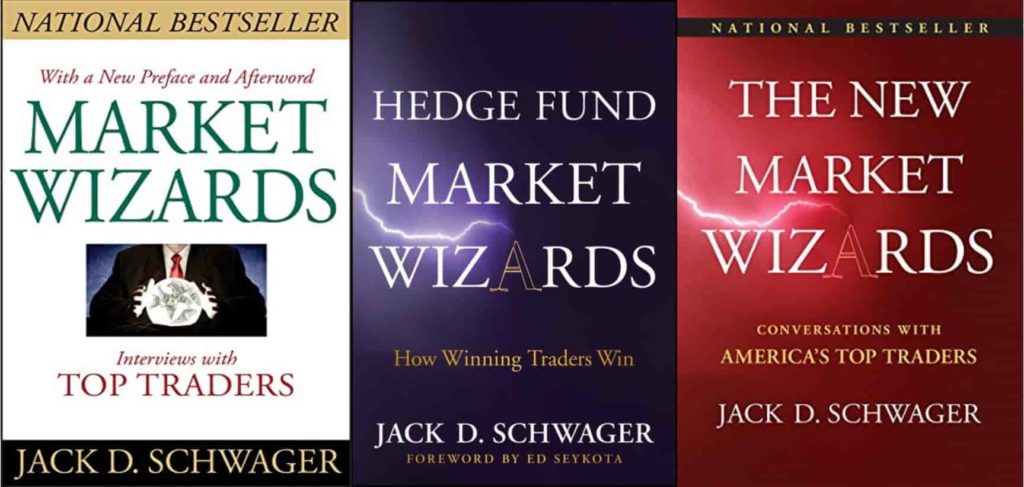
The idea behind the ‘Market Wizards’ series is that there already exist extremely successful traders, so why not just learn from them? Jack D. Schwager meets up with some of the top traders alive and interviews them about their trading approach, trading advice, the markets, their mindset
The ‘Market Wizards’ will teach you tons of important technical and psychological trading lessons. They allow you to see what kind of mindset you need
The ‘Market Wizards’ series consists of the following three books:
- Market Wizards – Interviews with Top Traders
- The New Market Wizards – Conversations with America’s Top Traders
- Hedge Fund Market Wizards – How Winning Traders Win
In my opinion, these books are written and structured in a very good manner. Nevertheless, some things might be hard to understand if you are a complete beginner to trading and the stock market. So if you are totally new to the markets, you might not understand everything in all of the books. Otherwise, I really think every trader should read and learn from the ‘Market Wizards’! It isn’t often that you get the opportunity to learn from dozens of the world’s most successful traders!C
6. Fooled by Randomness: The Hidden Role of Chance in Life and in the Markets by Nassim Nicholas Taleb
Nassim Nicholas Taleb,
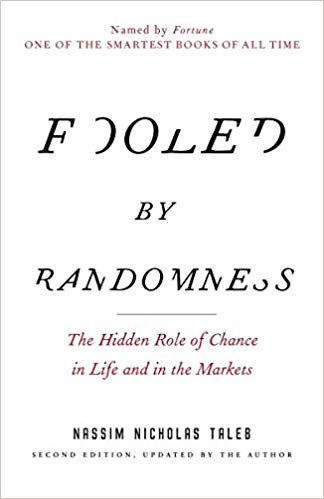
The 368-page long trading psychology book ‘Fooled by Randomness’ is about the role of randomness in the markets, science, evolution, past performance and our life in general. Furthermore, Nassim Nicholas Taleb writes about the completely overrated role of the media in the markets. He also presents how very rare events (black swans) impact our life in and outside the markets. In addition to that, he talks about the right and wrong way to manage risk. Certain cognitive biases and how to avoid them are another topic that Nassim Nicholas Taleb goes over.
One very interesting thing that is mentioned in ‘Fooled by Randomness’ is that in almost every moment the currently best performing traders are actually some of the worst traders. Without context, this might seem very counterintuitive or even paradoxical. Nassim Nicholas Taleb’s explanation of this statement is that the currently best performing traders are simply those that are best fitted to the current market environment. However, as soon as the market behavior deviates from its current behavior, these traders often blow up because they fail to adapt.
Let me give you an example:
During the incredible bull-run of Bitcoin, some traders made unbelievable amounts of money. The traders that were long the most amount of Bitcoin, made the most amount of money. So someone who had a highly leveraged long position in Bitcoin was likely one of the best performing traders of that time. But as soon as Bitcoin’s price stopped shooting up, these traders stopped making money. Many of these Bitcoin traders even lost most of their money on the sharp decline that followed after Bitcoin’s peek in December of 2017.
This means that the best performing traders during the Bitcoin mania often weren’t good traders at all. They simply were best fitted to the market at that exact time in history. You could say they just got lucky… Perhaps a result of randomness?
The Bitcoin craze is just one of countless examples. I hope it could give you some insight into why often the best performing traders frequently are the worst traders.
‘Fooled by Randomness’ is written in a quite amusing, slightly arrogant, but very understandable style. I definitely recommend reading it as it certainly has the potential to change the way you think about many things, including the significance of randomness in your trading and in your life.
Nassim Nicholas Taleb has released a second edition of his book ‘Fooled by Randomness’. As the newest version is longer and more detailed in some aspects, I recommend getting the newest and best version.
Conclusion
Having the right mindset and keeping your emotions in check while trading is an essential part of becoming a successful trader. One of the best ways to acquire the right mindset is by learning from the lifeworks of industry experts such as psychologists and highly successful traders. Books allow you to do exactly that.
I hope you enjoyed reading this list of the best trading psychology books. I have read all of the trading psychology books mentioned in this list and I do certainly recommend all of them!
Have you read any other trading psychology books that you think deserve a place on this list?
If so, make sure to let me know in the comment section below!

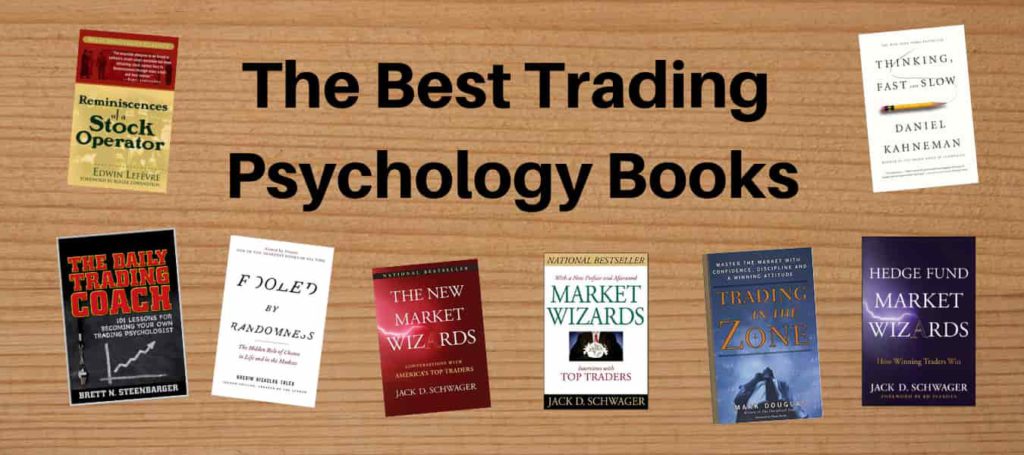
Thank you on the reviews of the trading psychology books. I totally agree, I am my worst enemy. I always make things worse than it is and think too much. I will consider buying the Daily Trading Coach. I love the fact that I do not have to read from the beginning to finish. Will also checked out Fool by Randomness, since I invested in Bitcoin, worst mistake I ever mad. Luckily I did not invest that much money in it, Thank god. Thank you again for sharing these wonderful books. Cannot wait to read them.Cheers!
Thanks a lot for your comment. I hope you could at least learn some valuable lessons from your Bitcoin losses. Hopefully, you will enjoy reading these books.
“Humans simply aren’t completely rational beings, especially not when hard-earned money is at risk.” Damn straight! That is why I think I’d make a terrible trader, but if there’s a book (or two) out there which can change that—count me in, because I’d love to learn how to trade properly.
I don’t think you really meant, “incomparable” here: “… [the] value you get for the price of one book is incomparable with any trading course”, but I get the gist, anyway. Of course it is cheaper to buy a book than to attend an expensive course from a hard-sell merchant. I once had a thought to go on such an event in London UK, but the price tag of £4000 (four thousand pounds sterling) for a two-day event was offputting, considering it didn’t come with any guarantees which I could discern.
However, all that said, I think these books target people who are already trading and need to address psychological handicaps they have already identified. For someone like me who hasn’t a clue about trading, the only book in which I’d have any interest is #6, “Fooled by Randomness: The Hidden Role of Chance in Life and in the Markets” by Nassim Nicholas, because one of the most common mistakes otherwise-rational people make is to see a pattern where actually there isn’t one. The “Jesus in a cup of tea” fallacy, one might say.
Hi,
Thanks for sharing your thoughts about these trading psychology books. I agree that some of these books aren’t aimed at complete trading beginners. But in addition to ‘Fooled by Randomness’, ‘Thinking, Fast and Slow’ is another book that can be read by anybody as it isn’t directly about trading or the markets.
Probably should’ve held on to that Bitcoin, huh?
Should’ve would’ve could’ve… Just because it went up, doesn’t mean that buying and holding would have been a good strategy. The same position in some other security could easily have led to you losing your entire investment or at least a good part of it. Judging a trade with hindsight and purely based on its outcome can lead to very flawed conclusions.